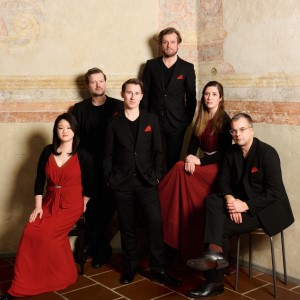Ensemble Polyharmonique

Ensemble Polyharmonique is a collective of singers whose core repertoire is the vocal music of the Renaissance and Baroque periods. Taking historical performance practice into account, the ensemble brings together influences from the German and Franco-Flemish singing cultures to create lively, poetic interpretations. The principal ensemble comprises six vocal soloists, a cappella or accompanied by a basso continuo, and can include up to 13 singers depending on programme requirements. Invitations to perform at festivals throughout Europe speak for the international reputation of Ensemble Polyharmonique. These include the Utrecht Early Music Festival, the Bachfest Leipzig, Meer Stemmig Gent, Musica Divina Mechelen, Les Nuits de Septembre Liège, the Trigonale Klagenfurt, the Thuringia Bach Festival, the Handel Festival in Halle and many more. In addition to their well-known early music repertoire, the ensemble dedicates itself to the discovery of unknown works from the 17th and 18th centuries and they have already released a number of recordings; in 2015 ‘Musicalische Seelenlust’ featuring music by Thomaskantor Tobias Michael (1592–1657) and in 2016 ‘Cavalli-Requiem’ with works by Francesco Cavalli (1602–1676) and Alessandro Grandi (1577–1630). 2017 saw the world premiere recording of Chor-Music auff Madrigal-Manier by Andreas Hammerschmidt (1611–1675) and in 2019, the full-length oratorical Markus Passion by Johann Georg Künstel (c.1645–1694) was released. In 2020, the ensemble released the recording Geistliche Chor-Music 1648 by Heinrich Schütz (1585–1672). In 2021, the recordings of Zwölf Madrigalische Trostgesänge by Wolfgang Carl Briegel (1626–1712) and the Historia Nativitatis followed.











 Recorded in the Bach Church Arnstadt
Recorded in the Bach Church Arnstadt